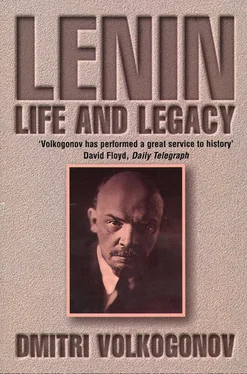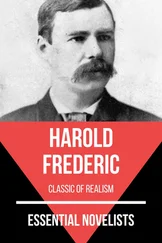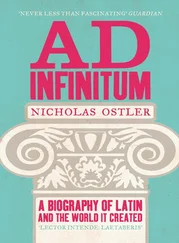Lenin and Inessa shared a deep feeling. They had their secrets, as Inessa herself wrote from Paris in December 1913 in a letter which, naturally, remained hidden in the archives as utterly unsuitable for the Party’s propaganda purposes. The Ulyanovs had been living in Cracow in Austrian Poland since October, remaining there until May 1914. The letter was a very long one, and we reproduce only extracts from it here. She uses the familiar form throughout:
Saturday morning.
My dear, Here I am in Ville Lumière and my first impression is one of disgust. Everything about the place grates – the grey of the streets, the over-dressed women, the accidentally overheard conversations, even the French language … It was sad that Arosa was so temporary, somehow transitory. Arosa was so close to Cracow, while Paris is, well, so final. We have parted, parted, you and I, my dear! And it is so painful. I know, I just feel that you won’t be coming here. As I gazed at the familiar places, I realised all too clearly, as never before, what a large place you occupied in my life, here in Paris, so that all our activity here is tied by a thousand threads to the thought of you. I wasn’t at all in love with you then, though even then I did love you. Even now I would manage without the kisses, if only I could see you, to talk with you occasionally would be such a joy – and it couldn’t cause pain to anyone. Why did I have to give that up? You ask me if I’m angry that it was you who ‘carried out’ the separation. No, I don’t think you did it for yourself.
There was much that was good in Paris in my relations with N.K. [Krupskaya]. In one of our last chats she told me I had become dear and close to her only recently … Only at Longjumeau and then last autumn over the translations and so on. I have become rather accustomed to you. I so loved not just listening to you, but looking at you as you spoke. First of all, your face is so animated, and secondly it was easy for me to look at you because you didn’t notice …
In the last part of the letter, marked ‘Sunday evening’, Inessa writes at length about a forthcoming lecture she is to give, and asks:
When you write to me about business matters, give me some indication of what the KZO [the Committee of Russian Social Democratic Party Organizations Abroad] may talk about and what it may not …
Well, my dear, that’s enough for today, I want to send this off. There was no letter from you yesterday! I’m rather afraid my letters are not reaching you – I sent you three letters (this is the fourth) and a telegram. Is it possible you haven’t received them? I get the most unlikely ideas thinking about it. I’ve also written to N.K., to your brother, and to Zina [Zinaida Lilina, the wife of Zinoviev]. Has nobody received anything? I send you a big kiss.
Your Inessa. 105
The tone, eloquence and content of this letter leave little doubt about the nature of Inessa’s feelings. Her remark that she would be satisfied if she could just see Lenin, and that ‘it couldn’t cause pain to anyone’, places a question mark over Lenin’s reasons for leaving Paris in June 1912. Plainly Inessa’s presence in the Ulyanov family orbit had at first met Krupskaya’s natural resistance. The fact that the three-cornered relationship was not a simple one is evidenced by the frequent cuts in the letters made by various Soviet editors, tasked with maintaining Lenin’s purity. Many of these excised parts have simply vanished. Not all of them, however.
Lenin’s letter to Inessa of 13 January 1917, when he was still in Switzerland, was published in volume 49 of the fifth edition of his works. Following the words, ‘Dear friend,’ the following lines were removed: ‘Your latest letters were so full of sadness and evoked such gloomy thoughts in me and aroused such feelings of guilt, that I can’t come to my senses …’ 106 The letter goes on in the same vein. Plainly, Lenin the puritan found the bond, which went well beyond platonic friendship, a hard one to bear. For Inessa too, accustomed as she was to yielding completely to her emotions, the secrecy and deceit were unbearable.
There are many such cuts in the ‘complete’ works. A week after the above letter, on 23 January 1917, Lenin wrote again:
Dear friend
… Apparently the lack of reply to several of my latest letters indicates – in connection with something else – a certain changed mood, a decision, your situation. At the end of your last letter a word was repeated twice. I went and checked. Nothing. I don’t know what to think, whether you are offended at something or were too distracted by the move or something else … I’m afraid to ask, as I know you don’t like questions, and so I’ve decided to think that you don’t like being questioned and that’s that. So, I’m sorry for [the questions] and won’t repeat them, of course. 107
This rigmarole could only be understood by the two people concerned, and plainly they had to take Krupskaya’s presence into consideration.
Lenin’s sojourn in Cracow was terminated on 26 July (8 August) 1914 when he was arrested in Nowy Targ on suspicion of spying. The authorities quickly released him, however, when a number of social democrats, notably Victor Alder in Vienna, but also Feliks Kon and Yakov Ganetsky, interceded, explaining that he was a sworn enemy of tsarism, with which Austria was now at war. Lenin’s two weeks in Austrian police custody became in Soviet historiography an act of vast revolutionary importance, for he was alleged to have spent the time ‘reflecting on the tasks and tactics now facing the Bolshevik Party; talking to imprisoned peasants, giving them legal advice on how to expedite their cases, writing requests and statements for them and so on’. 108
The Austrians did not yet realise that Lenin would become their ally. He hated both tsar and Kaiser, but, as he wrote to one of his trusted agents, Alexander Shlyapnikov, in October 1914, ‘tsarism is a hundred times worse than kaiserism’. 109 Yet even what they already knew about him prompted the Austrian authorities to cable the Nowy Targ prosecutor to ‘free Vladimir Ulyanov at once’. 110 Within a couple of weeks Lenin and Krupskaya were in Zurich and shortly after in Berne, where Lenin was soon reunited with Inessa. According to the official version, he suggested she give lectures, ‘work to unite the left socialist women of different countries’, helped her prepare a publication for women workers, and even ‘criticized her outline of the brochure’, appointed her to take part in the International Socialist Youth Conference, and gave her a host of Party missions to perform. This version does not, however, report that she was a frequent visitor at the Ulyanovs, that they often went for walks together, that she played the piano for Lenin, and that she joined the couple on holiday in Serenburg.
It was here in Switzerland in March 1915 that Krupskaya’s mother died. As Krupskaya recalled, the old lady had wanted to return to Russia, ‘but we had no one there to look after her’. She had often quarrelled with Lenin, but on the whole they had maintained a civil relationship. ‘We cremated her in Berne,’ Krupskaya wrote. ‘Vladimir Ilyich and I sat in the cemetery and after two hours they brought us a metal jug still warm with her ashes, and showed us where to bury them.’ 111 Yelizaveta Vasilievna nevertheless found her way back to Russia eventually: on 21 February 1969 the Central Committee Secretariat arranged for her ashes to be taken to Leningrad.
After Inessa had left for Paris, she and Lenin conducted a lively correspondence. He signed himself variously as ‘Ivan’, ‘Basil’, or sometimes even ‘Lenin’. Apart from their personal relationship, Lenin had come to rely on her in Party affairs to a considerable extent as well. In January 1917, for some reason, he decided Switzerland was likely to be drawn into the war, in which case, he told her, ‘the French will capture Geneva straight away … Therefore I’m thinking of giving you the Party funds to look after (to carry on you in a bag made for the purpose, as the banks won’t give money out during the war) …’ 112
Читать дальше












